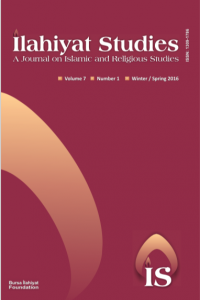Kitap İncelemesi
Yıl 2016,
Cilt: 7 Sayı: 1, 137 - 138, 01.10.2016
Öz
First Paragraph:
This is a concise but rich book, full of ideas and arguments, and it is based on the thesis, as its title suggests, that Islam is a Western religion. It is not clear to me what precisely that means for the author but I think it is supposed to mean that Islam is not to be viewed as an exotic Eastern religion alien to Western culture. There were after all many links with Europe even before the years of mass immigration and this is a book about sources, historical sources that link in particular Christianity and Islam, and their major actors, Jesus and Muḥammad. Campanini points out that Islam does not see itself as a new religion but indeed as the original monotheistic faith, yet he seems to me to be a bit too ready to accept this assertion. Just because that is a claim the religion makes we do not have to accept it, perhaps it is wrong. He is generally mild in his assessment of what religions say about their major biographical figures, so Jesus and Muḥammad are regarded as being described fairly realistically, but Moses by contrast is not. The critique of the historical Moses, developed in the past by Freud and today by Assmann, is taken to be plausible by Campanini, although he does not discuss how the suggestion of a lack of historicity in this figure would offend Islam, for whom of course Moses is a prophet.
This is a concise but rich book, full of ideas and arguments, and it is based on the thesis, as its title suggests, that Islam is a Western religion. It is not clear to me what precisely that means for the author but I think it is supposed to mean that Islam is not to be viewed as an exotic Eastern religion alien to Western culture. There were after all many links with Europe even before the years of mass immigration and this is a book about sources, historical sources that link in particular Christianity and Islam, and their major actors, Jesus and Muḥammad. Campanini points out that Islam does not see itself as a new religion but indeed as the original monotheistic faith, yet he seems to me to be a bit too ready to accept this assertion. Just because that is a claim the religion makes we do not have to accept it, perhaps it is wrong. He is generally mild in his assessment of what religions say about their major biographical figures, so Jesus and Muḥammad are regarded as being described fairly realistically, but Moses by contrast is not. The critique of the historical Moses, developed in the past by Freud and today by Assmann, is taken to be plausible by Campanini, although he does not discuss how the suggestion of a lack of historicity in this figure would offend Islam, for whom of course Moses is a prophet.
Anahtar Kelimeler
Toplam 0 adet kaynakça vardır.
Ayrıntılar
| Birincil Dil | İngilizce |
|---|---|
| Konular | Din Araştırmaları |
| Bölüm | Kitap İncelemeleri |
| Yazarlar | |
| Yayımlanma Tarihi | 1 Ekim 2016 |
| Gönderilme Tarihi | 15 Şubat 2016 |
| Yayımlandığı Sayı | Yıl 2016 Cilt: 7 Sayı: 1 |


